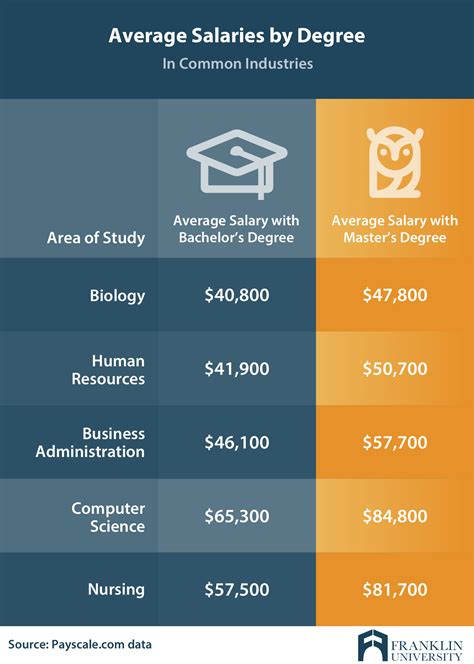The choice between pursuing a master’s degree or entering the workforce with a bachelor’s degree is a significant one that requires careful consideration. Both options offer distinct advantages and drawbacks, and the best decision depends on your individual circumstances, career goals, and financial situation.

Master’s Degree: The Pros and Cons
Pros:
- Increased earning potential: According to the Bureau of Labor Statistics, individuals with a master’s degree earn, on average, 20% more than those with only a bachelor’s degree.
- Career advancement: A master’s degree can open doors to higher-level positions and leadership roles within organizations.
- Specialization: Master’s programs provide specialized knowledge and skills in specific areas, which can enhance your competitiveness in the job market.
- Networking opportunities: Graduate school offers opportunities to connect with professors, peers, and industry professionals, building a valuable network.
Cons:
- Cost: Master’s programs can be expensive, ranging from tens of thousands to hundreds of thousands of dollars.
- Time commitment: Completing a master’s degree typically requires 1-2 years of full-time study, which can be a significant time investment.
- Opportunity cost: Pursuing a master’s degree may delay your entry into the workforce and the potential income you could earn.
Bachelor’s Degree: The Pros and Cons
Pros:
- Earlier entry into the workforce: You can begin your career sooner with a bachelor’s degree, gaining valuable work experience.
- Lower cost: Bachelor’s degrees are generally less expensive than master’s programs.
- Flexibility: Bachelor’s programs offer a broader range of majors and specializations, allowing you to explore different career paths.
Cons:
- Limited career options: A bachelor’s degree may limit your eligibility for certain positions that require advanced qualifications.
- Lower earning potential: On average, individuals with only a bachelor’s degree earn less than those with a master’s degree.
- Competition: The job market for bachelor’s degree holders can be competitive, particularly for highly sought-after positions.
The Right Choice for You
Ultimately, the decision between a master’s or bachelor’s degree depends on your individual aspirations, career goals, and financial circumstances. Consider the following factors:
- Career goals: Do your desired career paths require a master’s degree?
- Financial situation: Can you afford the cost of graduate school? Do you have the time and resources to commit?
- Personal motivations: Are you driven to pursue advanced knowledge and skills in a specialized field?
Combining the Best of Both Worlds
If you’re unsure whether a master’s or bachelor’s degree is the right path, consider the following options:
- Master’s with accelerated bachelor’s: Some universities offer combined programs that allow you to earn both a bachelor’s and master’s degree in a shorter timeframe than completing them separately.
- Professional master’s: Professional master’s programs are designed for working professionals who want to enhance their skills and qualifications without leaving their jobs.
- Part-time master’s: Part-time master’s programs offer a flexible way to pursue advanced education while balancing work and personal commitments.
Tips and Tricks
- Explore potential career paths: Research different careers and determine the educational requirements.
- Network with professionals: Connect with individuals in your desired career field to gain insights into job market demands.
- Consider return on investment: Calculate the potential financial return of pursuing a master’s degree compared to entering the workforce with a bachelor’s degree.
- Weigh the pros and cons carefully: Consider the advantages and disadvantages of both options before making a decision.
Common Mistakes to Avoid
- Assuming a master’s degree is always the best choice: A master’s degree is not necessary for all career paths.
- Overlooking financial implications: Graduate school can be expensive. Ensure you have the resources to cover the costs before committing.
- Pursuing a master’s degree without a clear career goal: A master’s degree should enhance your career prospects. Ensure you have a specific career path in mind before investing in graduate education.
- Choosing a program that doesn’t align with your interests: Select a master’s program that aligns with your career goals and passions to maximize the benefits of your investment.
Tables for Reference
| Degree Level | Average Annual Salary | Job Market Growth Rate |
|---|---|---|
| Bachelor’s Degree | $62,300 | 5.5% |
| Master’s Degree | $76,000 | 7.2% |
| Profession | Bachelor’s Degree | Master’s Degree |
|---|---|---|
| Software Engineer | Competitive | Highly competitive |
| Nurse | In-demand | High demand |
| Financial Analyst | Entry-level | Advanced roles |
| Cost of Master’s Programs | Average Tuition Range |
|---|---|
| Public Universities | $30,000 – $60,000 |
| Private Universities | $50,000 – $100,000 |
| Business Schools | $100,000 – $200,000 |
| Master’s Degrees with High Career Growth Potential |
|—|—|
| Artificial Intelligence |
| Data Science |
| Healthcare Management |
| Cybersecurity |
| Sustainable Energy |
